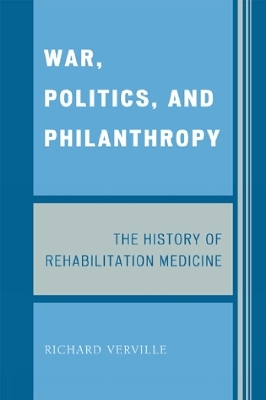
War, Politics, and Philanthropy
University Press of America (Verlag)
978-0-7618-4594-2 (ISBN)
War, Politics, and Philanthropy: The History of Rehabilitation Medicine describes the development of this remarkable field of medical care from its inception in WWI and WWII through its dramatic expansion during the 1980s, as stimulated by the Medicare program. The book vividly describes how the field developed in response to the need for care and rehabilitation of wounded soldiers, disabled veterans, and members of the workforce in the 1940s and 1950s. It focuses on the leadership and contributions of statesman Bernard Baruch, civil servant extraordinaire Mary Switzer, physicians Henry Kessler, Frank Krusen, and Howard Rusk, and the professional and disability associations with which they collaborated. The book ends with the crescendo of the enactment of the Americans with Disabilities Act, which embodied the vision and goals of rehabilitation medicine since the 1960s.
Richard Verville is a lawyer at the firm of Powers Pyles Sutter and Verville and has represented health care and rehabilitation medicine organizations for thirty-five years. He received the AMA Citation of Distinguished Service in 2004, the Gold Key Award of the American Congress of Rehabilitation Medicine in 1979, the Kessler Institute Henry Kessler Human Dignity Award in 1997, and the American Diabetes Association Charles H. Best Award for Distinguished Service in 1988. He is the author of many journal articles on rehabilitation laws, legislation, policy, and history.
Chapter 1 Foreword Chapter 2 Acknowledgements Chapter 3 Chapter 1 - Setting the Stage Chapter 4 Chapter 2 - In the Beginning: The Early Years of the Founders of Rehabilitation Medicine Chapter 5 Chapter 3 - The Roots of Rehabilitation Medicine in the Progessive Era, 1900 to 1920 Chapter 6 Chapter 4 - The Nineteen-Twenties and Small Steps Forward Chapter 7 Chapter 5 - The Thirties, Medicine, Social Insurance, and Rehabilitation at the Mayo Clinic Chapter 8 Chapter 6 - World War II, Howard Rusk, Henry Kessler, and the Baruch Committee Chapter 9 Chapter 7 - The Immediate Postwar Years: The VA, Private Rehabilitation Facilities, Unions, and a Medical Specialty in PM&R Chapter 10 Chapter 8 - Polio, FDR, and Rehabilitation Medicine Chapter 11 Chapter 9 - The Expansive 1950s: Rehabilitation Medicine Develops Under the Leadership of Mary Switzer and Howard Rusk Chapter 12 Chapter 10 - Rehabilitation Leadership in the Turbulent 1960s and the End of an Era Chapter 13 Chapter 11 - The 1970s: Vulnerability, New Leadership, and the Disability Movement Chapter 14 Chapter 12 - The 1970s: Congressional Leadership and the Golden Era for Comprehensive Rehabilitation and Disability Policy Chapter 15 Chapter 13 - The 1980s: Medicare Expansion; Rehabilitation Research at the NIH and the Maturation of Rehabilitation Medicine Chapter 16 Chapter 14 - The Americans with Disabilities Act (ADA) and Comprehensive Rehabilitation Medicine Chapter 17 Chapter 15 - A Brief Epilogue Chapter 18 Bibliography
| Verlagsort | Lanham, MD |
|---|---|
| Sprache | englisch |
| Maße | 154 x 232 mm |
| Gewicht | 469 g |
| Themenwelt | Medizin / Pharmazie ► Naturheilkunde |
| ISBN-10 | 0-7618-4594-1 / 0761845941 |
| ISBN-13 | 978-0-7618-4594-2 / 9780761845942 |
| Zustand | Neuware |
| Haben Sie eine Frage zum Produkt? |
aus dem Bereich


